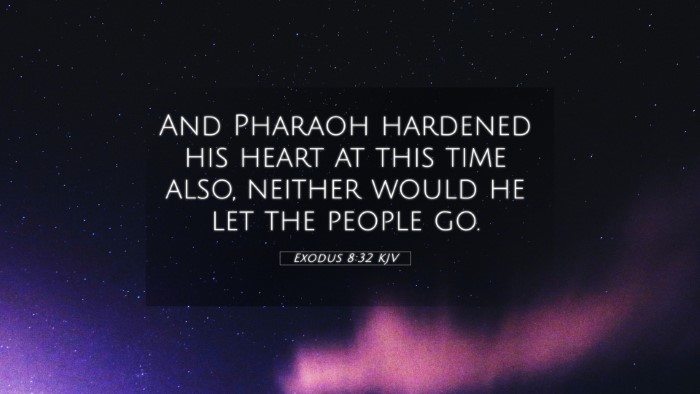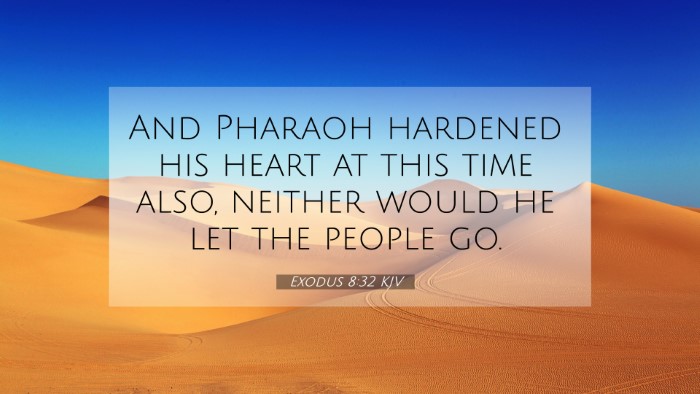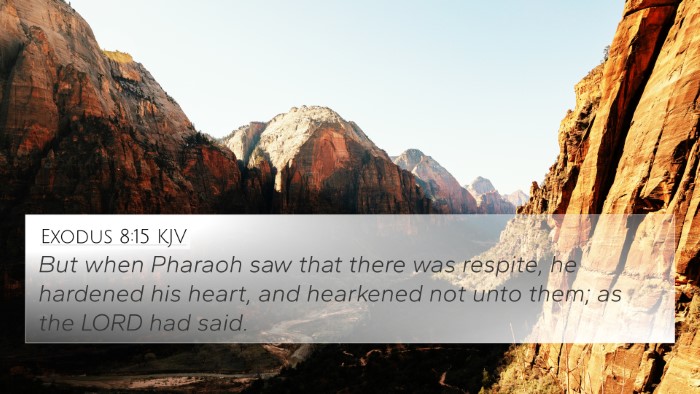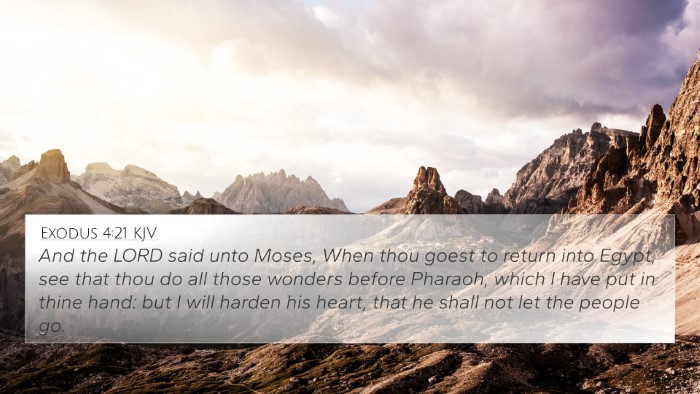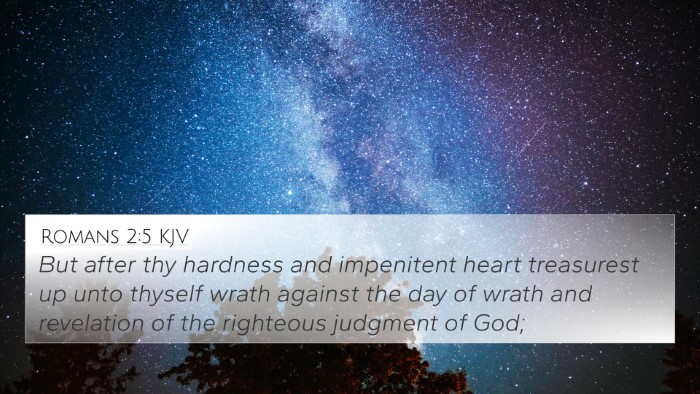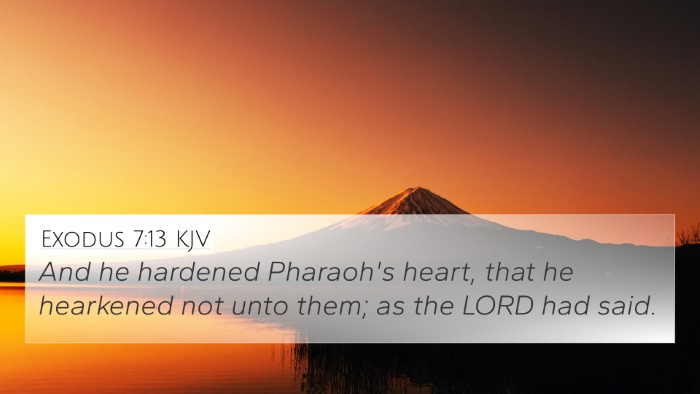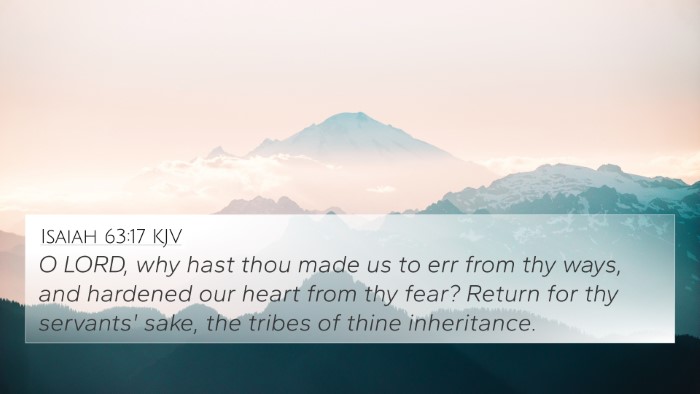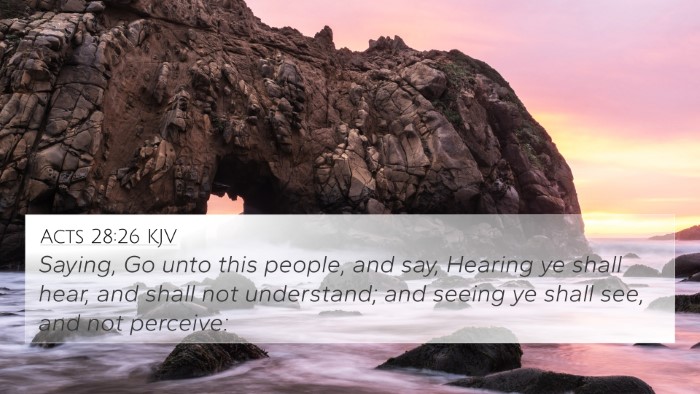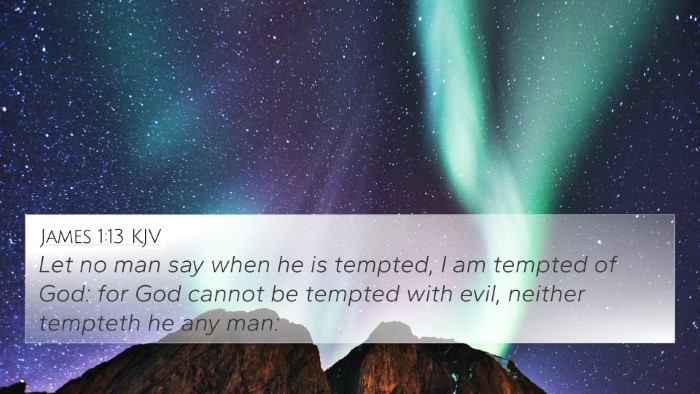Understanding Exodus 8:32
Exodus 8:32 states, "And Pharaoh hardened his heart at this time also, neither would he let the people go." This verse describes a pivotal moment during the plagues of Egypt, where Pharaoh's refusal to comply with God's command to free the Israelites illustrates a deeper theme of obstinacy and divine sovereignty.
Summary of Key Themes
This verse accentuates several theological themes:
- Pharaoh's Hardness of Heart: The repeated hardening of Pharaoh's heart signifies not only his personal stubbornness but also a larger narrative of God's power over human agency.
- Divine Sovereignty: Despite the plagues and the evident might of God, Pharaoh's refusal serves as a testament to the ultimate authority of God in directing human history.
- Judgment and Mercy: Alongside God’s judgments upon Egypt, there remains an underlying theme of mercy offered to Pharaoh, though he consistently rejects it.
Commentary Insights
Matthew Henry Commentary: Henry notes that Pharaoh's hardened heart serves as a warning against the dangers of rebellion against the divine will. His obstinacy amplifies the plagues’ severity and illustrates God’s justice in dealing with arrogance.
Albert Barnes Commentary: Barnes emphasizes the repeated nature of Pharaoh's hardening as indicative of God's control over the situation. He posits that Pharaoh was given multiple opportunities to repent, yet his persistent refusal highlights the peril of a hardened heart.
Adam Clarke Commentary: Clarke provides the view that Pharaoh's reaction can be seen as an act of defiance against both God and Moses. This defiance is rooted in pride, ultimately leading to severe consequences not just for Pharaoh but for all Egypt.
Bible Verse Cross-References
Understanding Exodus 8:32 can be enhanced through cross-referencing other relevant biblical texts. Here are important connections:
- Romans 9:17: "For the Scripture saith unto Pharaoh, Even for this same purpose have I raised thee up, that I might show my power in thee..." This verse illustrates God's purpose in Pharaoh's hardness.
- Exodus 7:13: "And he hardened Pharaoh’s heart, that he hearkened not unto them..." Highlights the interplay between divine sovereignty and human choice.
- Exodus 9:12: "And the Lord hardened the heart of Pharaoh..." Continues the discussion of God’s control over Pharaoh's responses.
- Isaiah 63:17: "O Lord, why hast thou made us to err from thy ways..." Reflects on the concept of hardened hearts in response to divine guidance.
- Jeremiah 5:3: "O Lord, are not thine eyes upon the truth?..." Calls attention to Israel's waywardness, similar to Pharaoh’s refusal.
- Proverbs 29:1: "He, that being often reproved hardeneth his neck, shall suddenly be destroyed..." A proverbial warning about the hardness of heart.
- Hebrews 3:15: "While it is said, Today if you will hear his voice, harden not your hearts..." A New Testament admonition addressing the dangers of refusing God.
Connections Between Bible Verses
By examining both Old and New Testament connections, one may identify patterns and themes related to human rebellion and divine authority. Here are a few insightful explorations:
- Rebellion in the Garden (Genesis 3): The choice of Adam and Eve to disobey echoes Pharaoh's hardening heart.
- Jesus' Parables (Matthew 13:14-15): The theme of hard hearts is explored in the context of those who refuse to hear the message of the Gospel.
- Peter's Denial (Luke 22:54-62): Even faithful followers can struggle with acknowledgment of God's will.
Why Cross-Referencing is Important
Cross-referencing Bible texts enables deeper understanding through comparative Bible verse analysis. It aids in illustrating:
- Thematic connections across different books of the Bible.
- Contextual meanings of particular verses.
- How different authors address similar themes.
- The overall unity of Scripture regarding God’s nature and human response.
Tools for Bible Cross-Referencing
Utilizing various tools enhances one’s ability to connect biblical verses:
- Bible Concordance: A useful resource to find keywords and phrases.
- Bible Cross-Reference Guide: Systems designed to track themes, ideas, and phrases across scriptures.
- Cross-Referenced Study Methods: Approaches to studying the Bible that focus on interconnected passages and themes.
Conclusion
Exodus 8:32 serves as a powerful reminder of the struggle between divine authority and human rebellion. By employing cross-referencing tools and studying thematic Bible verse connections, one can gain much clearer insights into the spiritual truths within this scripture. Through careful analysis and reflection, the narrative of Pharaoh's heart can speak volumes to contemporary believers about the importance of responsiveness to God's call.

